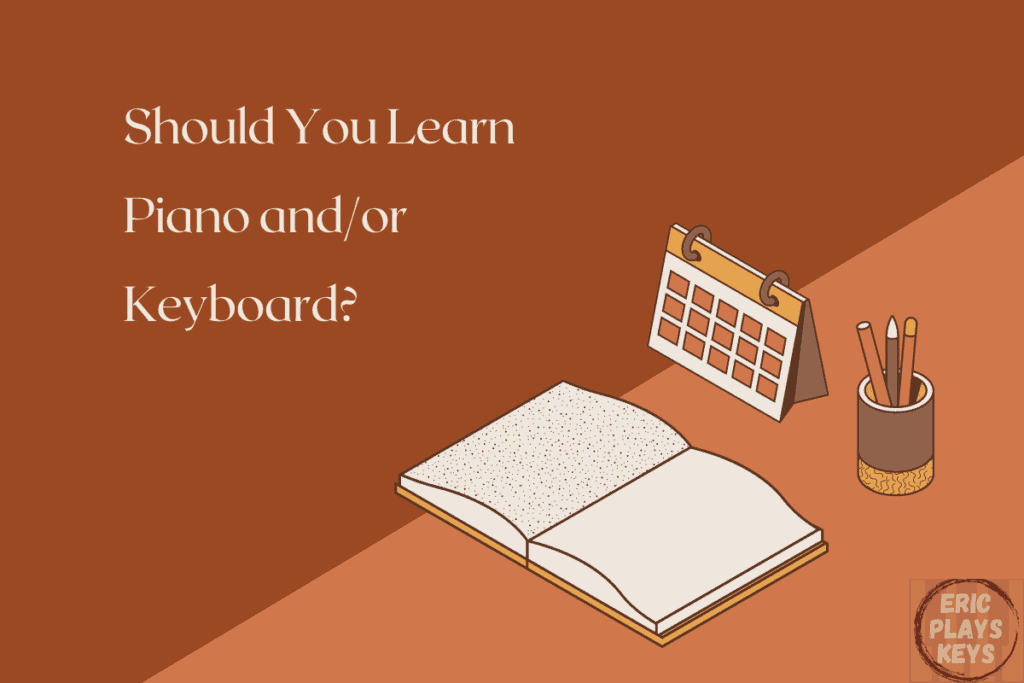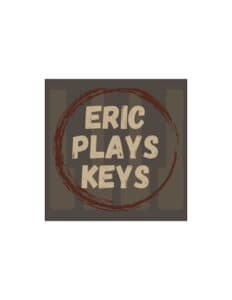
Learning piano and/or keyboard was one of the more important things I’ve done in my life. I’ve seen many of my musical peers and friends feel the same way, and I’ve also seen many people hate it and quit. It’s hard to determine which group you’ll fall into, so I’ve compiled some guidelines from patterns I’ve noticed.
You should learn piano and/or keyboard if you’re looking for a fun hobby, can afford an instrument, and want a creative outlet. However, learning piano is not for everyone, and some people prefer other instruments or other hobbies.
I’ll go into each of these criteria and provide some examples from my personal experience below!
Playing Piano is Fun for Some, Not For Others
I recognize that this one is somewhat obvious, but hard to overlook. There are certain people that seem to connect to the piano, and others that don’t. If you’re wondering if you want to start learning piano, ask yourself what led to your interest? Is it pressure from friends, parents, or other external factors? Do you feel drawn to the instrument? If you generally just feel excited about learning to play, then I’d say that’s a clear green flag. If it doesn’t just sound downright fun to you, I might recommend you look elsewhere for a hobby.
When I was a little kid, I was drawn to the piano and begged for lessons. I don’t even remember doing this – but it was clear to me and my family that I would take it seriously. Of course, this kind of interest has led to a lifetime long hobby and side hustle for me. I think playing piano/keyboard and making music is so much fun and a very important part of my life.
I used to play a lot of recitals and competitions as a kid, and there were so many other kids there who were being forced to play by their parents. They told me they resented having to do all this work, and they definitely quit as soon as they could. Other friends of mine, both kids and adults, have tried to pick up piano and given up because it was too hard.
The takeaway here is to just be aware that you may or may not connect to the instrument, and that’s ok! As far as determining if you should learn or not – listen to your gut, and keep reading!
Learning Can Be Costly, Sometimes
Unfortunately, we live in the real world and we need to be practical about the hobbies we take on. The first thing you’ll need to think about is buying an instrument, and whether this is something that’s affordable. Fortunately, a wide variety of options and price ranges are available to choose from – check out my article on how to determine your budget here. Consider whether you’re comfortable with these price tags, and if you can afford an instrument you’re happy with. If not, you can try looking into local piano studios and practice rooms as an alternative.
Next comes piano lessons. Some people prefer to take piano lessons, some don’t, and some don’t know! If you’re not sure if this is an expense you’ll need to worry about, check out my article on whether piano lessons are worth it here. If you decide that you want lessons, it’s likely going to cost you quite a lot. Of course, you can reduce this cost by taking lessons more intermittently, or exploring other online resources and teaching yourself to play.
Creative Outlets Are Important
I think playing any instrument, and especially piano, is a really great creative outlet to take on. As people we are drawn to creativity and expression, which can manifest in a variety of forms of art and music. Piano is a versatile instrument, giving musicians the ability to play pretty much any western song and freedom to express themselves however they want.
If you’re someone who loves music, or loves certain songs and certain artists, then I think you’ll really enjoy playing piano and learning music you connect to. However, I know other people who love music and yet are more than happy to never touch an instrument. Those individuals may connect more to painting, photography, dance, etc. If you already pursue a different creative outlet, or are drawn to another art form, that may be better for you to pursue than piano.
Check out my article ‘How to Make Playing Piano a Great Hobby‘ for some ideas on how to incorporate music more effectively into your life!
Role of Piano vs. Other Instruments
Piano and keyboard allows individuals to play entire songs by themselves, and is extremely versatile. Sometimes piano is meant as a solo instrument and is featured as the main attraction, and in other situations is more of a background instrument. For example, in classical music there’s a large body of pieces composed just for piano, in which the musician is in the spotlight. In genres like rock and pop, with the exception of a few songs (piano man anyone?) piano will likely take more of a background role. In jazz, pianists accompany other musicians the majority of the time, with intermittent solos.
You’ll want to think about how this compares to other instruments – wind instruments like saxophones and trumpets are often more at the center of attention, while instruments like bass or more often background. I like piano because it can go both ways, but I also sometimes imagine if I had played something like tenor saxophone and how much more attention I might get. Other times I wonder how much fun it would be to play drums instead, driving the band and making sure the music feels good rhythmically. Make sure to think about where you feel most comfortable in a band or performing in front of others – the front or the back? Try to choose your instrument, whether piano or otherwise, to be congruent with your personality.
Genre Matters
The genre you’re hoping to play will have a major influence on your approach to the piano, and you should consider that when choosing if you want to pursue learning. If you want to learn classical piano, think about whether you’re comfortable being the center of attention. Also, classical piano pieces typically require serious and intense practice, and the performances can be nerve-wracking. Make sure to think about whether you’d enjoy these challenges or not. For rock, pop, or jazz, piano is much more relaxing, and most of the time you’re taking a more supporting role to singers, guitarists, or wind instrument players. Some of you may enjoy this more, and feel freer to express yourself without so much of the pressure.
As a kid, I really enjoyed the challenges of learning very difficult classical pieces. Even more, I enjoyed the attention and praise I got when I pulled them off (audiences usually were willing to overlook the large number of mistakes I made). Eventually, I burnt out, and now I rarely play classical music. I enjoy playing jazz, R&B, pop, and rock (in that order) because I can just show up and play with minimal stress. The songs aren’t technically difficult, and there’s a lot more leeway to experiment. Other musicians may have different experiences than me, but I hope this provides some context to help you figure out whether learning piano is right for you.
My Personal Opinion: Give it a Shot!
If you still don’t know the answer to this question, there’s only one way to find out: take on the challenge to learn piano. Take a few lessons, watch a few Youtube tutorials, ask a friend, and do whatever seems easiest. Ignore expectations from others on what you should learn and do. Learn your favorite song, see how it feels to practice, see how it feels to fail, and how it feels when you finally get it! If you didn’t get your answer from this article, you’ll get your answer from trying. Good luck! If you decide to pursue learning piano or keyboard, I hope you enjoy it as much as I do.
